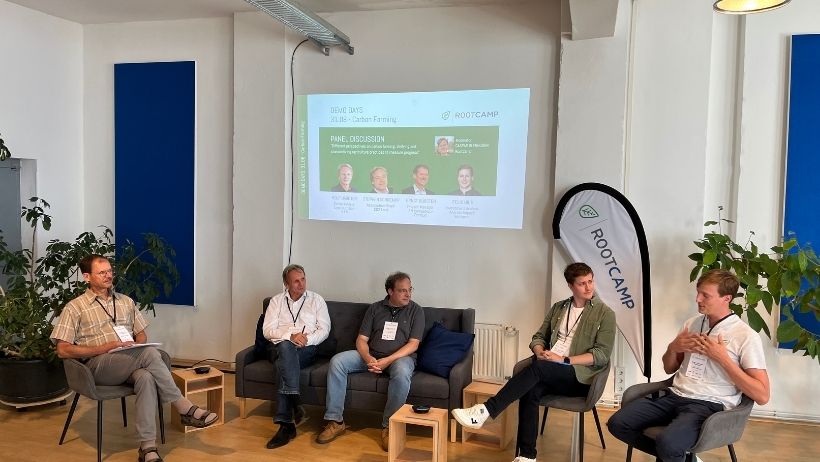After three months of intensive work, the RootCamp Acceleration Program Batch #3 reached its end. To complete this amazing journey, we organized not only one but 2 Demo Days onsite in Hanover with focus on livestock farming and carbon farming.
Transforming the livestock sector
Together with the German AgriFood Society, we are implementing the BLIVE project to boost innovation and start building a pan-European network in the livestock sector. Increased global demand from the society for better animal welfare, improved sustainability across the livestock value chain, as well as the effect of the climate change are only a few of the challenges the livestock sector is facing. Innovation is key and will remain essential to address these challenges, and to ensure the contribution of the sector to the global food and nutrition security. To support farmers in this process, new disruptive innovations are emerging. Technologies to monitor animal health and welfare, prevent disease outbreaks, and optimise animal nutrition are now available. Let's have a look at some of them.
Showcase time for RootCamp Startups
On the first Demo Day, the following startups from the current batch had the chance to present their innovative technology:
BIALTEC
BIALTEC, a startup based in Colombia, designs, and produces microencapsulated precision microbiomes for animal feed, which are capable of reconfiguring the intestinal microbiome by improving the animal feed conversion and gut health, maximizing the absorption of nutrients and minimizing the environmental impact.
Biorefic
Biorefic from Latvia works on a next-generation biorefinery technology for producing from agri-food fibers advanced prebiotic ingredients and microbial Omega-3 fatty acids. The ultimate gut microbiome enhancing ingredient, resulting from this process, improves animals’ health and immunity and boost their performance.
Cynomys
Cynomys based in Italy, developed and patented a IoT monitoring system able to measure more than thirty parameters related to air quality (e.g., ammonia, CO2), energy and water consumption, and provides livestock farmers with real-time data to monitor farm's performance and to plan corrective actions.
VetVise
VetVise located in Germany, developed a Machine Learning (AI) supported early warning systems based on 2D camera data. With this system, swine and poultry farmers are able to observe 24/7 their animals at the farm, assess animal behavior, and receive alerts related to feeding problems, tail biting, ventilation failure, among others.
Need for innovation and collaboration in the livestock sector
/RootCamp%20Demo%20Day%201%20Livestock%20keynote.jpg?width=694&height=390&name=RootCamp%20Demo%20Day%201%20Livestock%20keynote.jpg)
Ana Granados, Vice President of the Animal Task Force, presented the work of this European Public-Private Partnership that brings together the actors of the European livestock sector to draw a common view for a sustainable, competitive, and diverse livestock production sector in the EU through innovation and knowledge transfer. During her intervention, she mentioned some of the ongoing European initiatives such as Green Deal, Farm to Fork, and COP26 that are shaping the European livestock farming. She also highlighted the importance of collaboration among all actors in research, innovation, food production, policymakers towards a circular and sustainable food systems.
/RootCamp%20Demo%20Day%201%20panel%20livestock.jpg?width=800&name=RootCamp%20Demo%20Day%201%20panel%20livestock.jpg)
Additional inputs about the challenges and future of livestock farming were discussed during the panel moderated by Julia Köhn, from the German AgriFood Society. Wolfgang Heinzl, Director Business Development of the PHW Group; Lars Abraham, Co-Funder and CEO of dropnostix; and Philipp Rittershaus, Managing Director of RootCamp talked about the reduction of meat consumption in Europe due to the availability of alternative protein-based products. However, they agreed that livestock might continue to exist in Europe as an essential part of the food system, and the demand for high quality as well as local produced meat will remain. Startup driven innovation on livestock and investments in this sector are underdeveloped. Therefore, startups that can deliver added-value solutions to meet the sector needs could play an important role in attracting more investments and forming the future of livestock. In this sense, the panelists also emphasized the need for innovation in livestock and a legal framework that allows farmers to produce more efficiently and remain competitive compared with other regions. They also concluded that livestock farmers deserve more respect and recognition for the important work they are doing.
What’s next in the innovation hub?
The Demo Days of Batch#3 were a success, and we brought together many different experts. The conversation about livestock farming does not end here. If you are interested in knowing more about climate change and how livestock innovations can help with it, check out this blog article.
Last but not least we will attend EuroTier, the leading international trade fair for professional animal farming and livestock management, happening in Hanover, Germany, between the 15th and 18th of November 2022. Looking forward to meeting you!
/rootcamp_logo_white_2022.png?width=2123&height=630&name=rootcamp_logo_white_2022.png)

/RC%20logo%202022.png?width=2325&height=703&name=RC%20logo%202022.png)




